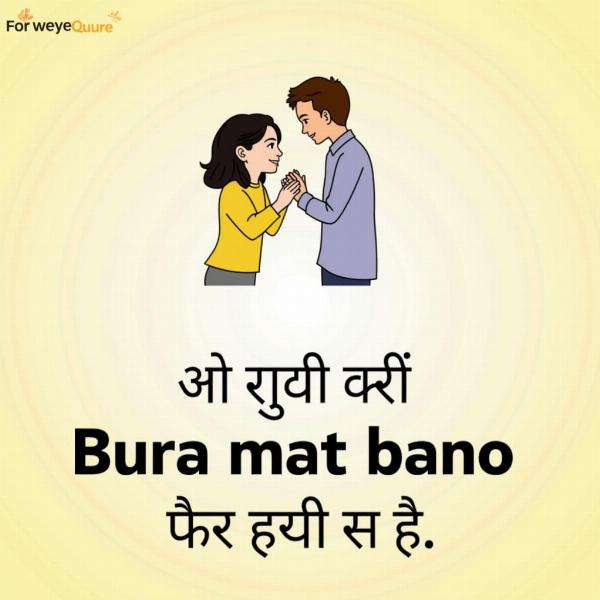“Don’t be mean” is a common phrase urging kindness and discouraging unkind behavior. Understanding its meaning in Hindi allows for a deeper appreciation of cultural nuances related to politeness and respect. This article explores various Hindi translations and their cultural context, offering insights into how to express and understand this sentiment in different situations.
Hindi Translations of “Don’t Be Mean”
Several Hindi phrases effectively convey the sentiment of “Don’t be mean,” each with slightly different connotations. Some common translations include:
- बुरा मत बनो (Bura mat bano): This is a direct and widely understood translation meaning “Don’t be bad.” It’s suitable for most situations and carries a general sense of discouraging unkindness.
- रूखा मत बनो (Rukha mat bano): This translates to “Don’t be rude” or “Don’t be harsh.” It emphasizes avoiding disrespectful or insensitive behavior, particularly in communication.
- कठोर मत बनो (Kathor mat bano): Meaning “Don’t be harsh” or “Don’t be strict,” this translation emphasizes avoiding excessive severity or unkindness.
- बेहया मत बनो (Behaya mat bano): This translates to “Don’t be shameless” or “Don’t be disrespectful.” It’s a stronger rebuke, implying a lack of regard for social norms and decency.
- गलत मत करो (Galat mat karo): While literally meaning “Don’t do wrong,” this can also convey the essence of “Don’t be mean” when referring to specific actions.
 Bura Mat Bano Hindi Translation
Bura Mat Bano Hindi Translation
Cultural Context of Politeness in India
Indian culture places a high value on respect, especially towards elders and those in positions of authority. Using respectful language and gestures is crucial. The concept of “Don’t be mean” is deeply ingrained in cultural values, emphasizing compassion, empathy, and harmonious interactions.
Practical Applications of “Don’t Be Mean” in Hindi
Understanding the various Hindi translations allows you to tailor your language to specific situations. For instance, you might use “Rukha mat bano” when advising someone to soften their tone, while “Kathor mat bano” might be appropriate when discussing disciplinary actions.
Why is it Important to Avoid Being Mean?
Being mean can have detrimental effects on relationships and overall well-being. It creates a negative environment, fosters resentment, and can lead to lasting emotional damage. Cultivating kindness and empathy, on the other hand, promotes positive interactions and strengthens bonds.
How to Respond to Mean Behavior
If you encounter mean behavior, responding with calmness and assertiveness can be effective. You can use phrases like “कृपया ऐसा मत कहो (Kripya aisa mat kaho)” meaning “Please don’t say that” or “मुझे यह अच्छा नहीं लगा (Mujhe yeh achcha nahin laga)” meaning “I didn’t like that.”
Conclusion
Understanding the nuances of “Don’t be mean” in Hindi provides valuable insights into Indian culture and communication. By using appropriate translations and embracing the underlying values of respect and kindness, you can foster positive interactions and build stronger relationships. Remember, choosing the right words can make all the difference.
FAQ
-
What is the most common way to say “Don’t be mean” in Hindi? Bura mat bano is the most common and versatile translation.
-
Is there a difference between “Rukha” and “Kathor”? While both mean “harsh,” Rukha emphasizes rudeness in communication, while Kathor implies strictness or severity.
-
How can I politely tell someone they are being mean? You can use phrases like “Kripya aisa mat kaho” (Please don’t say that) or “Mujhe yeh achcha nahin laga” (I didn’t like that).
-
Why is politeness important in Indian culture? Politeness is a cornerstone of Indian culture, reflecting respect for elders, traditions, and harmonious social interactions.
-
What are some other ways to express kindness in Hindi? Phrases like “Dhanyavaad” (Thank you), “Kripya” (Please), and “Swagat hai” (Welcome) are common expressions of politeness and kindness.
-
How does understanding “Don’t be mean” in Hindi help with cultural understanding? It provides insights into the importance of respect, empathy, and appropriate communication in Indian society.
-
What are the consequences of being mean? Being mean can damage relationships, create negativity, and lead to emotional distress.
Meaning-Hindi.in is your one-stop solution for all your Hindi translation needs. We offer a wide range of services, from business and legal document translation to website localization and educational material translation. Our team of expert translators ensures accurate and culturally sensitive translations, catering to diverse needs. Whether you require technical manuals, legal documents, or website content translated, we have the expertise to deliver high-quality results. Contact us today at [email protected] or call us at +91 11-4502-7584. Meaning-Hindi.in is committed to providing professional and reliable translation services.